November is Diabetes Awareness Month, but it’s always important to remember that managing the condition well can lead to a better quality of life. That’s easier said than done, but BlueCross is always right here to help.
In April, we began testing a digital care management app, starting with members who have diabetes. Since then, we’ve added members with hypertension, chronic obstructive pulmonary disease, coronary artery disease, congestive heart failure, asthma and depression — and we’re developing additional programs for 2020, including maternity and oncology.

One of the app’s most valuable features is secure messaging that allows members to interact with a BlueCross registered nurse or licensed health professional.
Members can send messages to their care team at any time, who will respond as quickly as possible within normal business hours. Our team often uses the app to send screening reminders, like for the blood glucose, kidney and eye measures that are so vital for members with diabetes.

Other app capabilities include:
- Daily checklist related to condition
- Medication list
- Reminders for medications, appointments and exercise
- Surveys
- Goal setting
- Activity tracker
- Library of “favorited” articles and videos
- Glossary of diabetes terms
Several of our care managers have been with the pilot program since the beginning and have seen real results for their members. Here, they share just a few of those success stories.
Lori Hurst, case manager and registered nurse
Lori often finds herself speaking to members after a recent diagnosis — members who may be reeling from the news.
“When someone doesn’t feel well and hears ‘You have diabetes’ from their doctor, they can just shut off,” she says. “That’s a major life change, and it’s difficult to process all at once.”
Lori is passionate about the app because members can read, study and ask questions at their own speed. Her greatest success story so far concerns a middle-aged member who was struggling to get her diabetes medications.

“She didn’t have a car and was relying on a relative to take her to get her to the pharmacy, but she was unable to take her medication as prescribed,” Lori says. “I worked with her through the app and encouraged her to try mail order.”
The savings proved to be beneficial for the member, who is now following her doctor’s recommendations and has improved her A1C.
“Through the app, we’ve also helped her with public transportation options to get her to her doctor’s appointments,” Lori says. “The app also has her medication list and she’s set medication reminders, so I know she’s taking them when she should. Plus, she and her family are all less stressed without having to worry about getting her where she needs to be. It’s a peace of mind situation all around.”
“Stories like these are why I wanted to do this — this is going to change the face of case management, not only for us but for our members because they have a direct line to us and can send us messaging at any time.”
Heather Everett, case manager and registered nurse
Like Lori, Heather has been involved with the diabetes app pilot program since its inception. She believes its effectiveness boils down to one factor: convenience.
“Most of us carry our phones everywhere, and this app allows members to have a list of their medications with them all the time,” she says. “That can be helpful during a doctor’s appointment. I’ve had a member in her doctor’s office message me because she had forgotten something she needed to ask. I was able to respond in real time.”

One member recognized the convenience of the tool and has now completed multiple programs.
“She started with diabetes and got comfortable using the app to help manage that condition. Then she wanted stress management, weight loss, and help increasing her physical activity,” Heather says. “Those were all supplemental programs we could add. She’s probably done five or six of the programs within the app, and she’s always so thankful.”
“This app has made her feel like more of her own advocate.”
The member later recognized she had a behavioral health need, and Heather was able to connect her with help for that, too.
“I asked Virginia Bizzell, one of our behavioral health clinicians, to speak with her in the app,” Heather says. “This member was more comfortable and secure sharing what she’s going through without worrying about one of her co-workers overhearing her.”
Virginia Bizzell, behavior health case manager and licensed professional counselor
In a separate conversation, Virginia recalls working with Heather to assist that same member.
“She was experiencing a good bit of depression and anxiety, partially related to her diabetes diagnosis, but also related to early childhood trauma,” Virginia says. “The member was hesitant and concerned about going back to therapy, but that’s where healing normally takes place. I helped her realize that if a person experiences any kind of emotional healing, it can have a positive effect on any type of illness, especially diabetes.”

Now in therapy, the member continues to keep in touch with Virginia through the app. Virginia doesn’t know if they would have had this kind of breakthrough had they spoken over the phone.
“I have some members who will message me all day long, and that’s what their needs are right now,” she says. “Some write really long messages, and so I try to match that. If he or she took the time to write out what they’re going through in great detail and explain it to me, then they deserve a response that accounts for how courageous it is to actually share that story.”
“Every time a trauma story is shared, there’s healing.”
Like Lori and Heather, Virginia sees this resource as a game-changer.
“It’s a very smart system and very intuitive,” she says. “Not only is it providing the material for them to read at their own pace and in a nonintrusive way, it’s also giving me information about their progress that helps me know when and if I need to check in on them.”


 Jesse joined the BlueCross BlueShield of Tennessee corporate communications team in 2017. A Chattanooga native, he has more than 15 years’ experience in content creation, management, and strategy for consumer audiences, including a six-year stint in health care marketing.
Jesse joined the BlueCross BlueShield of Tennessee corporate communications team in 2017. A Chattanooga native, he has more than 15 years’ experience in content creation, management, and strategy for consumer audiences, including a six-year stint in health care marketing.